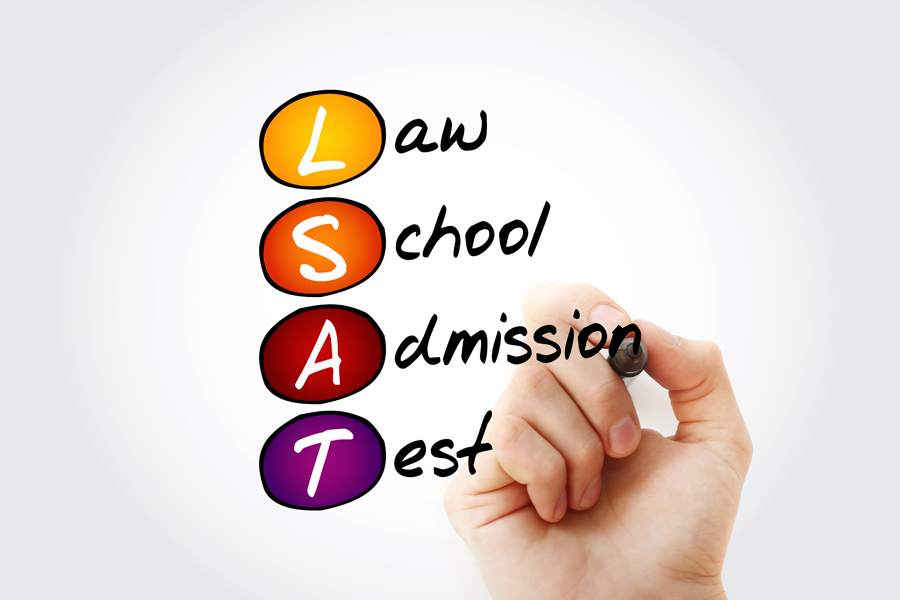
Three areas are tested in this half-day test: logical reasoning, analytical reasoning, and reading comprehension. There are 35 questions in the LSAT sections. A section of 35 sample questions for future exams is included along with the scored portion. The Law School Admission Council (LSAC) administers the exam at its testing centers worldwide seven times per year.
How is the LSAT scored?
On the LSAT, three out of five sections contribute to the final score. The “raw score” of a test taker is not penalized for incorrect answers, like in some standardized tests. On a bell curve, raw scores are distributed from 120 to 180, with a median of 150. As a result, a score of 151 would place the tester in the top half of all test takers. Testers scoring 165 would be in the top 90th percentile. Only one percent of test-takers score higher than 173.
Is the LSAT required for law school admissions?
There are 205 law schools accredited by the American Bar Association (ABA) that accept the LSAT for admission. The LSAT is, however, increasingly being replaced by the Graduate Record Examination (GRE). In either case, ABA-approved law schools require some standardized testing as these test scores are a major indicator of a law school graduate's ability to pass the Bar Exam, which is a requirement for anyone wanting to practice law. The majority of jurisdictions require a law degree to practice law.
See Also: The LSAT Is No Longer Required At These And Other Law Schools: Why Law Schools Are Ditching The LSAT
How significant is the LSAT for admissions?
Among the factors considered for law school admission are your LSAT score, your undergraduate academic record, your undergraduate major, as well as your recommendations and prior experience. US News & World Report ranking of law schools heavily factors in the LSAT for admissions. Most schools consider the LSAT score to be the most important determinant of admissions. Due to its emphasis on logic and reasoning (instead of memorizing subjects), the LSAT is likely to give a better indication of a student's success in law school, particularly when they begin their first year of traditional law school.
Is it possible to take the LSAT more than once?
A law school applicant may take the LSAT three times in a single testing year, five times over five years, and no more than seven times in a lifetime. Schools typically consider the score applicants report as their highest. Some schools, however, consider the average of the two highest scores. When the difference between two scores is greater than five points, the Law School Admission Council recommends averaging the scores that are within five points of each other.
What should I do to prepare for the LSAT?
Considering that LSAT scores are important in the admissions process, ensuring the best score possible requires adequate preparation. Practice taking sample questions from all three sections is the best preparation. The LSAC offers sample questions. For those who prefer self-study, there are also companies that offer comprehensive LSAT prep courses. In addition to traditional courses, students can also take online LSAT prep courses at their convenience.
What are the 4 sections of LSAT?
Getting a decent score on the LSAT requires you to know the test. If you have never taken the LSAT, just showing up at a test center cold and expecting to ace the questions is not something you can expect.
On the other hand, if you find standardized tests challenging in general and the LSAT especially so, you probably need to spend more time practicing in order to improve your scores. Regardless of your situation, stay motivated and prepare with the certainty that you will improve with dedicated practice.
The LSAT consists of four parts:
- Analytical reasoning section
- Logical reasoning section
- Reading comprehension section
- Writing sample section
The LSAT writing samples are the only sections not subject to multiple-choice questions, and they always come last. Multiple-choice questions may appear in any order. There are six sections in the test: two scored sections of logical reasoning, one scored analytical reasoning section, one scored reading comprehension section, one writing sample, and one unscored section that may be any of the three multiple-choice sections.
There is no indication of which section is unscored, and the unscored section looks just like any other section of the LSAT. Each section lasts 35 minutes.
The unscored variable section you take consists of questions that the LSAC is considering for use on a future LSAT. LSAC wants to see how well these new questions work when presented to actual LSAT takers. Observation, logical reasoning, or reading comprehension are all possible sections that are not scored.
LSAT Prep Timeline
The LSAT registration deadline is about a month in advance of each test date:
- January: Take a free LSAT practice test to calculate your diagnostic score.
- February: Start thinking about an LSAT prep course (strongly recommended in-person or online courses).
- March: Check upcoming LSAT test dates, registration deadlines, and the logistical information you will need to know for the big day.
Where can I find practice LSAT questions?
Preparing for the LSAT involves familiarizing yourself with the mechanics of the test:
- What does it look like?
- What is being asked of you?
- How do you physically provide answers to the test questions?
If your test will be administered in the same format, you should become familiar with the LSAT. You can also estimate how much time you can spend on each question by taking the official practice tests under time constraints. In addition, you will be able to determine which types of questions require more practice.
When you understand the test instructions and the nature of the questions, you will be able to plan your time wisely on the day of the test and handle distractions efficiently.
Official LSAT Prep on LSAC’s LawHub
With the Official LSAT PrepSM available through LawHub, you can immerse yourself in a simulation of taking the four-section or the LSAT-Flex. Everything that you can do during the test will be available on the practice test - ruling out answers, marking passages, setting screen preferences, and more. You will be able to build skills and confidence by practicing these tests.
Through LSAC's LawHub, two LSAT PrepTests (including a bonus LSAT-Flex version) and an Official LSAT-Flex Sample test are available free of charge. For just $99, you can access more than 70 full Official LSAT PrepTestsTM for one whole year with Official LSAT PrepPlusSM.
Paper-and-Pencil LSAT Prep
On the LSAC website, you can find a free sample LSAT if your LSAT is being administered in paper-and-pencil format.
Other test preparation resources include Official LSAT Prep books and eBooks. There are three full practice tests with explanations for every question in the Official LSAT SuperPrep and SuperPrep II. There are also dozens of additional Official LSAT Prep tests available for purchase.
What month should I apply to law school?
In addition to your application materials, your personal statement should be carefully mulled over and revised multiple times. Make sure your personal statement is a reflection of your character by asking someone who knows you well and has good critical eyes to read it. Clearly demonstrating your interest in law and the field you are considering will appeal to admissions officers.
- September: Start working on your law school applications and personal statements around September.
- November: Aim to submit all your law school applications, regardless of the official deadline, by late November or early December.
See Also: The Law School Admission Test: How Will The Change In LSAT Reporting Affect Students?
Conclusion
A law school applicant can only determine whether law school is a good fit for them by taking the LSAT, which is the only test accepted by all ABA-accredited law schools. Students who want to maximize their chances for admission and be prepared for law school should take the LSAT. Law schools may accept other tests for admission, but students who want to maximize their chances for acceptance should take the LSAT.
About Harrison Barnes
No legal recruiter in the United States has placed more attorneys at top law firms across every practice area than Harrison Barnes. His unmatched expertise, industry connections, and proven placement strategies have made him the most influential legal career advisor for attorneys seeking success in Big Law, elite boutiques, mid-sized firms, small firms, firms in the largest and smallest markets, and in over 350 separate practice areas.
A Reach Unlike Any Other Legal Recruiter
Most legal recruiters focus only on placing attorneys in large markets or specific practice areas, but Harrison places attorneys at all levels, in all practice areas, and in all locations-from the most prestigious firms in New York, Los Angeles, and Washington, D.C., to small and mid-sized firms in rural markets. Every week, he successfully places attorneys not only in high-demand practice areas like corporate and litigation but also in niche and less commonly recruited areas such as:
- Immigration Law
- Workers Compensation
- Insurance
- Family Law
- Trust and Estate
- Municipal law
- And many more...
This breadth of placements is unheard of in the legal recruiting industry and is a testament to his extraordinary ability to connect attorneys with the right firms, regardless of market size or practice area.
Proven Success at All Levels
With over 25 years of experience, Harrison has successfully placed attorneys at over 1,000 law firms, including:
- Top Am Law 100 firms such including Sullivan and Cromwell, and almost every AmLaw 100 and AmLaw 200 law firm.
- Elite boutique firms with specialized practices
- Mid-sized firms looking to expand their practice areas
- Growing firms in small and rural markets
He has also placed hundreds of law firm partners and has worked on firm and practice area mergers, helping law firms strategically grow their teams.
Unmatched Commitment to Attorney Success - The Story of BCG Attorney Search
Harrison Barnes is not just the most effective legal recruiter in the country, he is also the founder of BCG Attorney Search, a recruiting powerhouse that has helped thousands of attorneys transform their careers. His vision for BCG goes beyond just job placement; it is built on a mission to provide attorneys with opportunities they would never have access to otherwise. Unlike traditional recruiting firms, BCG Attorney Search operates as a career partner, not just a placement service. The firm's unparalleled resources, including a team of over 150 employees, enable it to offer customized job searches, direct outreach to firms, and market intelligence that no other legal recruiting service provides. Attorneys working with Harrison and BCG gain access to hidden opportunities, real-time insights on firm hiring trends, and guidance from a team that truly understands the legal market. You can read more about how BCG Attorney Search revolutionizes legal recruiting here: The Story of BCG Attorney Search and What We Do for You.
The Most Trusted Career Advisor for Attorneys
Harrison's legal career insights are the most widely followed in the profession.
- His articles on BCG Search alone are read by over 150,000 attorneys per month, making his guidance the most sought-after in the legal field. Read his latest insights here.
- He has conducted hundreds of hours of career development webinars, available here: Harrison Barnes Webinar Replays.
- His placement success is unmatched-see examples here: Harrison Barnes' Attorney Placements.
- He has created numerous comprehensive career development courses, including BigLaw Breakthrough, designed to help attorneys land positions at elite law firms.
Submit Your Resume to Work with Harrison Barnes
If you are serious about advancing your legal career and want access to the most sought-after law firm opportunities, Harrison Barnes is the most powerful recruiter to have on your side.
Submit your resume today to start working with him: Submit Resume Here
With an unmatched track record of success, a vast team of over 150 dedicated employees, and a reach into every market and practice area, Harrison Barnes is the recruiter who makes career transformations happen and has the talent and resources behind him to make this happen.
A Relentless Commitment to Attorney Success
Unlike most recruiters who work with only a narrow subset of attorneys, Harrison Barnes works with lawyers at all stages of their careers, from junior associates to senior partners, in every practice area imaginable. His placements are not limited to only those with "elite" credentials-he has helped thousands of attorneys, including those who thought it was impossible to move firms, find their next great opportunity.
Harrison's work is backed by a team of over 150 professionals who work around the clock to uncover hidden job opportunities at law firms across the country. His team:
- Finds and creates job openings that aren't publicly listed, giving attorneys access to exclusive opportunities.
- Works closely with candidates to ensure their resumes and applications stand out.
- Provides ongoing guidance and career coaching to help attorneys navigate interviews, negotiations, and transitions successfully.
This level of dedicated support is unmatched in the legal recruiting industry.
A Legal Recruiter Who Changes Lives
Harrison believes that every attorney-no matter their background, law school, or previous experience-has the potential to find success in the right law firm environment. Many attorneys come to him feeling stuck in their careers, underpaid, or unsure of their next steps. Through his unique ability to identify the right opportunities, he helps attorneys transform their careers in ways they never thought possible.
He has worked with:
- Attorneys making below-market salaries who went on to double or triple their earnings at new firms.
- Senior attorneys who believed they were "too experienced" to make a move and found better roles with firms eager for their expertise.
- Attorneys in small or remote markets who assumed they had no options-only to be placed at strong firms they never knew existed.
- Partners looking for a better platform or more autonomy who successfully transitioned to firms where they could grow their practice.
For attorneys who think their options are limited, Harrison Barnes has proven time and time again that opportunities exist-often in places they never expected.
Submit Your Resume Today - Start Your Career Transformation
If you want to explore new career opportunities, Harrison Barnes and BCG Attorney Search are your best resources. Whether you are looking for a BigLaw position, a boutique firm, or a move to a better work environment, Harrison's expertise will help you take control of your future.
Submit Your Resume Here to get started with Harrison Barnes today.
Harrison's reach, experience, and proven results make him the best legal recruiter in the industry. Don't settle for an average recruiter-work with the one who has changed the careers of thousands of attorneys and can do the same for you.
About BCG Attorney Search
BCG Attorney Search matches attorneys and law firms with unparalleled expertise and drive, while achieving results. Known globally for its success in locating and placing attorneys in law firms of all sizes, BCG Attorney Search has placed thousands of attorneys in law firms in thousands of different law firms around the country. Unlike other legal placement firms, BCG Attorney Search brings massive resources of over 150 employees to its placement efforts locating positions and opportunities its competitors simply cannot. Every legal recruiter at BCG Attorney Search is a former successful attorney who attended a top law school, worked in top law firms and brought massive drive and commitment to their work. BCG Attorney Search legal recruiters take your legal career seriously and understand attorneys. For more information, please visit www.BCGSearch.com.
Harrison Barnes does a weekly free webinar with live Q&A for attorneys and law students each Wednesday at 10:00 am PST. You can attend anonymously and ask questions about your career, this article, or any other legal career-related topics. You can sign up for the weekly webinar here: Register on Zoom
Harrison also does a weekly free webinar with live Q&A for law firms, companies, and others who hire attorneys each Wednesday at 10:00 am PST. You can sign up for the weekly webinar here: Register on Zoom
You can browse a list of past webinars here: Webinar Replays
You can also listen to Harrison Barnes Podcasts here: Attorney Career Advice Podcasts
You can also read Harrison Barnes' articles and books here: Harrison's Perspectives
Harrison Barnes is the legal profession's mentor and may be the only person in your legal career who will tell you why you are not reaching your full potential and what you really need to do to grow as an attorney--regardless of how much it hurts. If you prefer truth to stagnation, growth to comfort, and actionable ideas instead of fluffy concepts, you and Harrison will get along just fine. If, however, you want to stay where you are, talk about your past successes, and feel comfortable, Harrison is not for you.
Truly great mentors are like parents, doctors, therapists, spiritual figures, and others because in order to help you they need to expose you to pain and expose your weaknesses. But suppose you act on the advice and pain created by a mentor. In that case, you will become better: a better attorney, better employees, a better boss, know where you are going, and appreciate where you have been--you will hopefully also become a happier and better person. As you learn from Harrison, he hopes he will become your mentor.
To read more career and life advice articles visit Harrison's personal blog.






